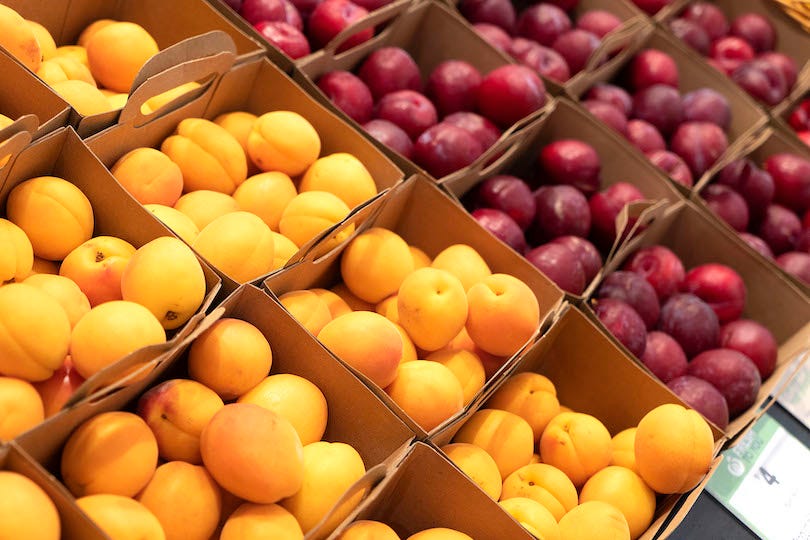
Good morning and welcome to The Bulletin for Thursday 24 September, by Alex Braae for The Spinoff. Presented in partnership with Z Energy.
In today’s edition: Horticulture industry facing labour crisis, details of new cases spark concern, and Canterbury candidate under fire for local government record.

Fears are growing that fruit will simply rot on the vine this season, because nobody will be there to pick it. Plenty of this sort of horticultural work is done by people on the Recognised Seasonal Employer (RSE) work scheme, who come from overseas. But as Radio NZ reports, even with changes made to immigration policy, growers associations fear that only around 20% of the required workforce will be allowed in.
The issue is likely to start really hurting growers next month, when strawberries are ready to be picked. One News had a story about the country's leading strawberry grower, who said New Zealanders weren't going for the jobs, which are physically intensive and difficult, and that the government was being inflexible on allowing Samoan workers through. She said consumers would see high prices, the packhouses wouldn't have jobs, and much of the crop would be lost. But a sharp eyed twitter user spotted the job listing, and noticed a pertinent detail: "Most of the work available is paid by bonus piecerate - where you are required to produce enough to earn at least the current minimum wage to retain your position." Those are pretty tough conditions for someone to go out of their way to work under.
It's possible that supply and demand will kick in, and growers will simply have to pay more for scarcer labour. But as Stuff reports, desperation is starting to set in. Even with the story quoting rates of $25-27 an hour (which is a suspiciously high rate compared to the current listings on the Backpackers Job board) other options are being seriously considered. Among them – tertiary students on summer break, or prisoners on day-release. Australia is having similar problems, and even more punitive solutions are being put forward, like hoping that a cut in the Jobseeker benefit will result in people forced out of work in other areas coming forward.
Meanwhile on the subject of immigration, this is an interesting piece about how it has entirely disappeared from the election campaign. As Newsroom's Dileepa Fonseka writes, there really is no shortage of issues that could be debated right now, even with the borders largely closed. This includes how to help the group of out of work migrants who can't either leave or get new jobs.
Three new community Covid-19 cases were announced yesterday, causing consternation that a new cluster was emerging. Our live updates has more detail on them, but in brief: Two of the cases were on the same charter flight as the 'long incubator' (the guy who only tested positive after coming out of managed isolation) and the third was a household contact of the two on the flight. The concern is that the trio only started self-isolating recently, after possibly being in Auckland while infected for several days.
Some curious coverage from local media of National's Banks Peninsula candidate Catherine Chu: In the last week The Press has done stories about her not seeming to be across her portfolio as a DHB member, and followed it up with a piece about her not showing up to remotely as many Council briefings (which she also sits on) as her colleagues. Chu herself said the briefings weren't necessarily the only way of learning about issues, and she spent her time in the community and talking to businesses. The Banks Peninsula seat itself is an open one, being made up in large part of the now disestablished Port Hills electorate, held by the retiring Ruth Dyson.
Remember yesterday when I said the Green party weren't being clear on their coalition bottom lines? Well, MP Julie Anne Genter has told a business audience that actually their wealth tax policy, aimed at the wealthiest 6% of the country, would be a bottom line, reports the NZ Herald. Labour's revenue spokesperson Stuart Nash immediately ruled it out, but given increasing inequality it could actually turn out to be an unexpectedly popular policy. Meanwhile speaking of wealth, Michael Andrew has looked into the unstoppable progress of the housing market, which is marching ever-upwards despite every other indicator going backwards.
The Reserve Bank is looking at introducing a 'Funding for Lending' programme earlier than expected, reports Interest's Jenée Tibshraeny. The idea behind that is that the Reserve Bank would give commercial banks money at very low rates, on the proviso that those banks then lent it out to businesses. Initially the consideration had been for an FLP programme some time next year, to be coupled with a negative official cash rate, but now the FLP is looking more like a project for the end of this year.
We'll have more feedback on the Ardern vs Collins debate further down the page, but in the meantime, a pertinent bit of criticism. Leonie Hayden has pointed out how there was basically no mention of te ao Māori throughout – a shameful erasure given there are so many issues worth canvassing our potential PMs on. She recommended that people should watch the Māori electorate debates currently being rolled out by The Hui – strongly agree on that.
If you want even more debate reaction, have a listen to the latest episode of Gone By Lunchtime. And you're definitely going to want to watch this from Jose Barbosa, who managed to sum the debate up in a brilliant two and a half minute video.
A quick correction after an early morning brain-melt: This piece by Robin Martin shared in yesterday's Bulletin was of course published not on Stuff, but on Radio NZ, where Robin Martin actually works.
Got some feedback about The Bulletin, or anything in the news?
Drop us a line at thebulletin@thespinoff.co.nz

Right now on The Spinoff: Stewart Sowman-Lund dives into the Act party list to see who might be joining David Seymour in the next parliament. Hayden Donnell has a devastating analysis of what Labour is and isn't actually doing with its incredible popularity. Robyn Hunt criticises the assisted dying referendum, in light of the impact it could have on an already stretched health system and the disabled. Matthew McAuley writes about a new series exploring the te reo journeys of three New Zealanders. There's a curious piece from Ngā Taonga, who are hunting for a few classic old NZ films that appear to have disappeared without trace.
And it's time to introduce an important new project – the 100 Year Forecast. That will be an interactive climate series that takes what we know about the science, and applies it to what it will mean for how we live over the next century.
I asked for a bit of feedback yesterday on the TVNZ debate, which was watched by more than a million people. That's kind of why it was such an important moment – almost no other political event this year will have that kind of audience. And I got that feedback loud and clear – my inbox is absolutely groaning under the weight of it all, which is a very nice problem to have. I've now read it all – if I haven't responded, my apologies – and this is a flavour of what you all had to say.
Some didn't really see anything new in it all. Jerram said "neither party promoted anything mind blowingly inspirational or unexpected." Lynn said it was predictable, and that she'd "much prefer good hard-hitting interviews of candidates individually. That way they would be asked really relevant questions on their past performance, their new policies, and how they would implement them."
A few people found a line to dislike from either leader, which was defining. For Michal, it was Collins saying she owned rental property in a trust. "That was a gotcha moment for me. Claiming to represent the world of 'ordinary kiwis ' she blew her credibility." Kathryn meanwhile thought that Ardern failed to defend her governing record, "particularly in JAs own portfolio of child poverty. It was interesting that JA couldn’t control the narrative as she normally does." And Ray said "the PM kept saying the government had a plan but nobody knows what it is.
For Collins, some glimpsed the familiar face of a former PM. Marguerite said "Collins has acquired Muldoon's characteristic raised cheekbone sneer, frequently in response to anything Adern said. Probably not the only thing she's inherited from him?" It's not a bad comparison, regardless of whether you see either or both in a positive or negative light. For quite a few responders, the performance of Collins looked simply unpleasant rather than strong.
Many of you disagreed with the general punditry consensus, which was that Collins came out on top. James gave a good example of that – "when the pundits said Jacinda had underperformed and Judith had come out impressively, we wondered if they'd been watching the same debate. It made us wonder if those pundits, who follow these leaders so closely, are so used to seeing Judith perform so poorly and Jacinda so well, that this felt like an improvement for Judith and a bad night for Jacinda." On the punditry, Karen said "clearly most of them are still impressed by the adversarial, point scoring style of Judith Collins – I believe most of us out here in the viewing public have moved on from that." On balance, the clear majority of responders said they preferred Ardern's performance, though I'd hesitate to call that a scientific sample.
There was some criticism of the moderation of John Campbell. It's a tricky one, because his interview style involves setting out context and making it really clear what his question is driving at. But as Min put it, "it would be interesting to see how many minutes each the 3 participants actually spoke. I would expect John Campbell would be way out front."
And finally, Catherine had a response to it all which I'm sure many of the 1.1 million viewers shared. "It was boring and I turned it off at 8pm." Alison had a similar reaction – "won't be watching the next two - life is too short!" Here's hoping you both make it out to see your local candidates debate each other at least.
In sport today, a cool piece about what an elite bunch of martial artists did to get through Auckland's level three lockdown. The Project visited City Kickboxing (the gym that is currently producing some of the best UFC fighters in the world) to talk about how when L3 was announced, a whole bunch of them just moved in, beds and all, and just trained constantly. If that sounds like your idea of hell, well, it was for some of the fighters too by the looks of it.
That's it for The Bulletin. If you want to support the work we do at The Spinoff, please check out our membership programme




